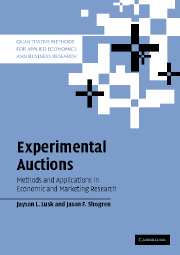Book contents
- Frontmatter
- Contents
- List of figures
- List of tables
- 1 Introduction
- 2 Incentive compatible auctions: theory and evidence
- 3 Value theory
- 4 Conducting experimental auctions: some preliminaries
- 5 Conducting experimental auctions
- 6 Data analysis
- 7 Valuation case studies
- 8 Auction design: case studies
- 9 Validity of experimental auctions
- 10 The future of experimental auctions
- References
- Index
9 - Validity of experimental auctions
Published online by Cambridge University Press: 27 October 2009
- Frontmatter
- Contents
- List of figures
- List of tables
- 1 Introduction
- 2 Incentive compatible auctions: theory and evidence
- 3 Value theory
- 4 Conducting experimental auctions: some preliminaries
- 5 Conducting experimental auctions
- 6 Data analysis
- 7 Valuation case studies
- 8 Auction design: case studies
- 9 Validity of experimental auctions
- 10 The future of experimental auctions
- References
- Index
Summary
Introduction
This chapter addresses the question of whether experimental auctions are valid in the sense that they accurately measure the theoretical notions of values laid out in Chapter 3. Determining whether a measurement instrument is valid is a complex concern for social scientists – made more difficult in that the theoretical constructs we seek to measure are latent and unobservable. Validity refers to the extent to which a measurement instrument actually measures what it purports to measure. We must be clear about the object of measurement in experimental auctions. Many psychologists have attacked traditional economists' view of preferences arguing that valuations are malleable, contextual, and even constructed on the spot (e.g., see Bettman, Luce, and Payne, 1998; Gunnarsson et al., 2003). This argument is about the appropriateness of a given theoretical model or construct; not with the validity of a measurement device per se.
We follow the economists' notion of value as the theoretical construct of interest (e.g., Chapters 2 and 3) and we seek to determine the validity of experimental auctions in measuring these latent variables. Our goal is to explore whether experimental auctions provide an accurate measure of value and whether elicited values respond in ways predicted by economic theory. Our focus on economists' views of values and preferences serves as benchmark behavior against which one can assess the validity of experimental auctions.
- Type
- Chapter
- Information
- Experimental AuctionsMethods and Applications in Economic and Marketing Research, pp. 247 - 268Publisher: Cambridge University PressPrint publication year: 2007



